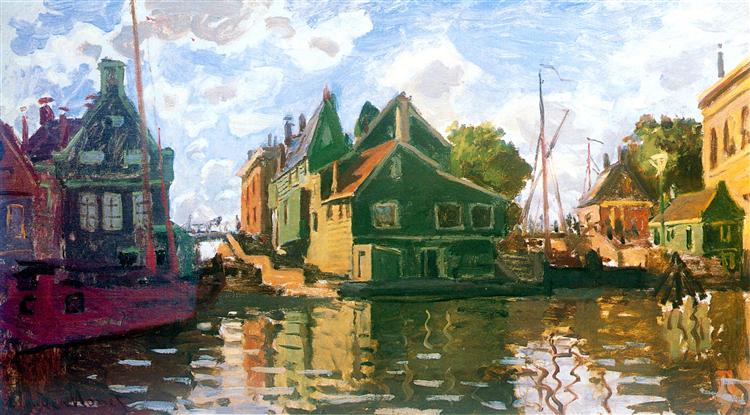Beskrivning
Claude Monet’s painting “Zaandam – Canal – 1871” encapsulates one of the most vibrant moments in the Impressionist master’s artistic output. In this work, Monet invites us to immerse ourselves in a landscape that breathes life, in an instant that captures not only light and color, but also a sense of place that is unmistakably Dutch. Painted during his trip to the Netherlands, this work resonates with a deep connection to the surroundings, characterized by its canals and the unique architecture of the region.
Looking at the composition, it is evident that Monet uses a distinctive technique to convey movement and fluidity. The lines of the canal, which gently meander across the canvas, are accompanied by the balanced arrangement of the buildings that flank the scene. This arrangement creates a harmonious play between the water space and the architecture, suggesting a continuity between natural and built elements. Perspective is crucial; it feels as if we are drawn into the scene, with the canal guiding our gaze from the foreground to the distant horizon.
The use of colour in “Zaandam - Canal - 1871” is one of the most captivating features of the work. Monet employs a rich and varied palette that includes vibrant blues, soft greens and warmth in the ochre tones of the buildings, creating a painting that reflects daylight in all its facets. The reflections in the water become a visual game that challenges our perception, reproducing the colours of the sky and buildings with a sense of freshness and luminosity. This almost ethereal way of capturing light is one of the trademarks of Monet’s style, in which light and atmosphere are as vital as the objects he painted.
While there are no human characters in the scene, the work evokes a sense of everyday activity that resonates with the viewer. While the lack of human figures may incite a sense of tranquility and contemplation, it also suggests a vibrant life in the background, where boats and inhabitants interact with the environment. This intentional emptiness can be interpreted as a space for the viewer to project their own narrative and emotional connection to the landscape.
“Zaandam – Canal – 1871” stands as an exceptional example of Impressionism, a movement that sought to capture the ephemeral essence of a moment in time. Monet’s attention to the changing light and atmosphere of nature parallels his contemporary work in other series, such as those of early daylight and garden landscapes, where he also plays with the vibration of colour and light. This approach not only defines his work, but also establishes a dialogue with the viewer, who is invited to see beyond what is painted, to experience the transformation of nature in real time.
Monet’s work has had a lasting impact on art history, and “Zaandam – Canal – 1871” sits firmly at the centre of this narrative as an example that captures the harmony between man, his environment and the light that unites them. Through this painting, we glimpse not only Monet’s technical mastery, but also his deep love of the natural world and constant exploration of colour and perception, elements that make this work an enduring testament to the beauty found in the everyday.
KUADROS ©, a famous painting on your wall.
Hand-made oil painting reproductions, with the quality of professional artists and the distinctive seal of KUADROS ©.
Painting reproduction service with satisfaction guarantee. If you are not completely satisfied with the replica of your painting, we will refund 100% of your money.

